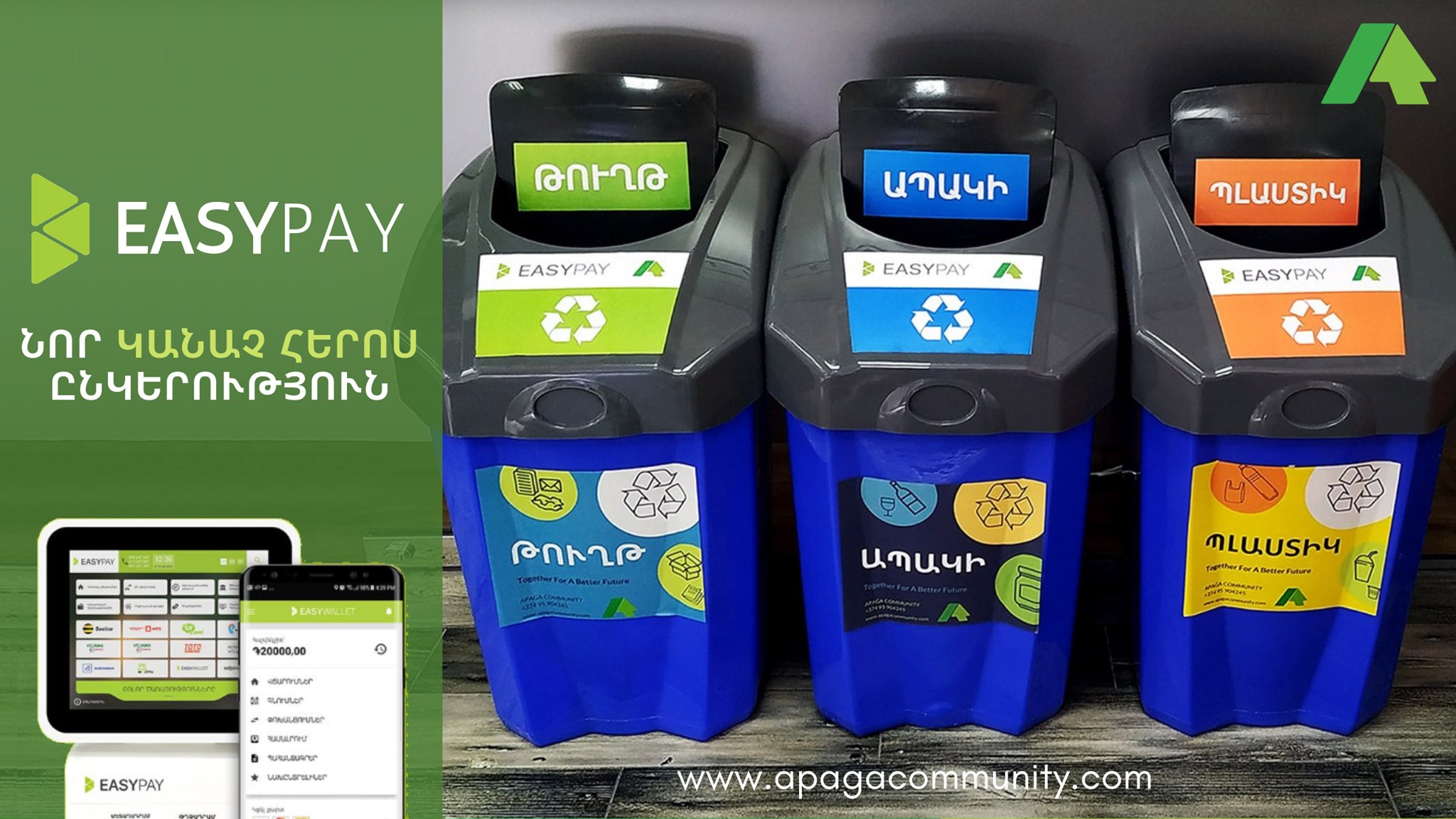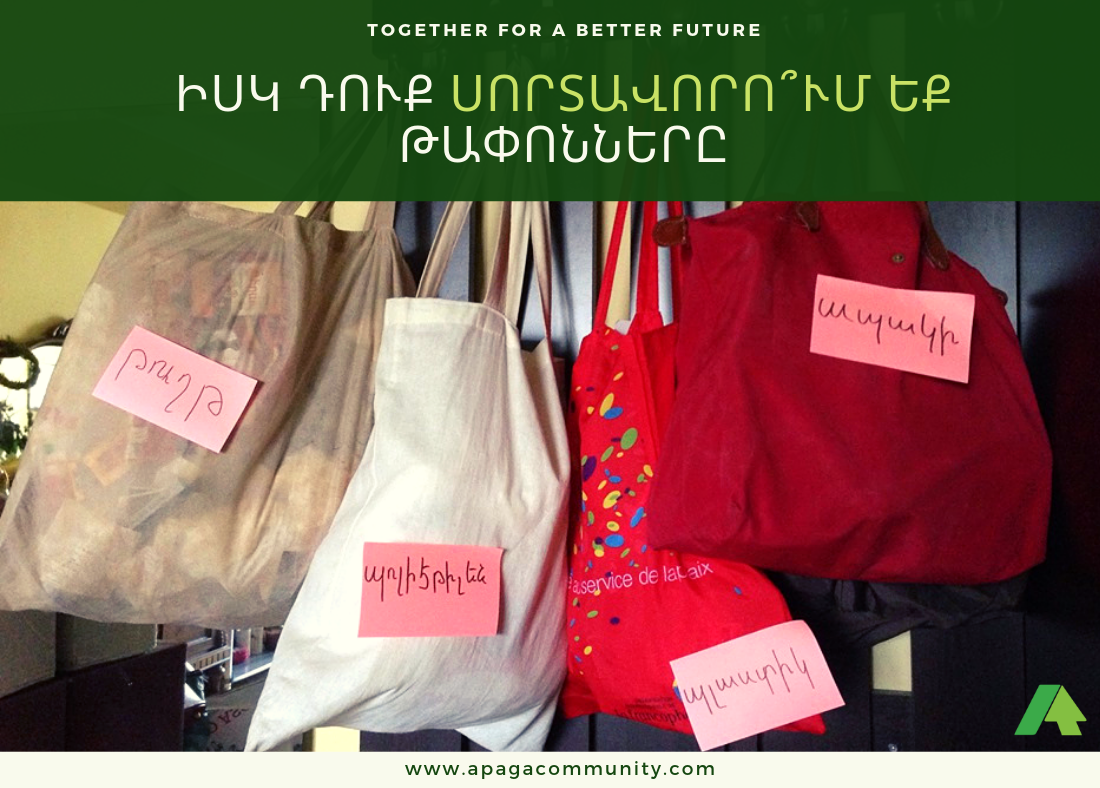
Yerevan’s struggle to manage the city’s waste has been dominating the news cycle lately. However, what Armenians do with their refuse is an age-old question. The Nubarashen landfill, located on the outskirts of the working-class neighborhood from which it gets its name, is quickly reaching capacity. The dumpsite has accumulated almost 10 million tons of waste since it started operating in the 1950s. Recyclable plastics make up roughly 30 percent of the 300,000 tons of trash making their way to landfills each year.
The Armenian government has plans to replace the site with a new ‘sanitary’ landfill, designed with technical assistance from the European Union. The plans do not include a recycling plant however. Local officials ruled it out as too costly.
However, Yerevan does have a long-running recycling network—of sorts. Across the city, homeless—often elderly—people can be seen rummaging through garbage bins, collecting glass bottles and tin cans and returning these items to large bottling companies for a profit. However, this practice is highly sensitive to fluctuations in the price of new glass.
Still, thousands upon thousands of easily reusable or recyclable materials continue to make their way into the seemingly-endless stream of trash flooding the country’s landfills.
Successive governments have responded to recycling initiatives with enthusiasm, but the task of locating available funds from the state budget seems like a fool’s errand. The prohibitive cost of collecting, transporting, sorting and transforming these items has forced the private sector to write off recycling as a viable enterprise, until now.
When Haik Kazarian returned to Armenia after decades living in Canada, he could not find any recycling options for his plastics and glass. Determined not to throw away single-use plastics, he set his mind on reducing his consumption. Once that became impossible, he started hoarding his empty plastic and glass containers until he could no longer ignore the giant pile of yogurt jars and milk bottles in his living room.
Looking for a recycling solution, he turned to the repatriate community for help, eventually coming into contact with Misha Zamskoy and Cedric Solms, two students at UWC Dilijan, and apparently shared his interest. Their research revealed that Yerevan had no shortage of factories capable of processing recycled waste. What the city lacked was the dedicated logistics chain to transport recycled items to their collection points. These services are typically taxpayer-funded in most countries, but not in Armenia. So they decided to take the private route.

Together they founded Apaga Community, a social platform built around a recyclable waste transportation logistics service. For a base fee of 8000 AMD ($16) a year, Apaga provides a pickup service for household paper, metal and glass waste. Subscribers are also eligible for discount coupons at various participating businesses across the city.
Apaga’s innovative business model, mapped out by Zamskoy and Solms, relies on several key factors. It does not rely on taxpayers or state subsidy. Subscriptions are affordable for most Yerevantsis. The operation is easily scalable. Apaga also offers the first type of service that rewards subscribers without a deposit system through third-party bonuses, thus providing a financial incentive to participate in addition to environmental motivations.
Developing this business model was not easy. The team had to understand the local market, customer behavior, set pricing and figure out what kind of incentives would motivate subscribers, all while navigating Armenia’s complicated legislative and regulatory system.
Their efforts have started paying off. Kazarian says they collected over five tons of recyclable material in the previous year. The company already has over 500 subscribers and works with some 50 partners. However, their main challenge remains convincing consumers that recycling is neither free nor is it a source of magic income. “People don’t realize that recycling is pretty much always funded by taxpayers and fines, and it is not even close to being efficient/effective in most countries,” he explains.
That being said, Haik believes that he has, in fact, come up with a solution that would actually make recycling totally free. He calls it the SmartApaga container, which, as the name implies, would be the world’s first smart recycling container. These bins, which have been designed and manufactured in Armenia, will be rolled out shortly. Placed in locations with high levels of foot traffic, such as supermarkets, smart containers can accept any sort of plastic. A subscriber can activate the bin by scanning a QR code on their smartphone and simply dump recyclable items, which are automatically weighed and sorted internally. Users then receive discounts for various restaurants or stores.
The smart recycling container’s real advantage is that these strategically consolidated collection points make transportation easy, quick and cost-effective. Haik says that this model is not only scalable for Armenia, but the entire world as well. While this concept will almost certainly help raise consumer enthusiasm and alleviate the burden on the country’s exhausted waste disposal apparatus, it does not single-handedly solve the core problem. The real solution to Armenia’s waste management crisis comes in the form of consumption reduction. The Armenian government has already toyed with the idea of banning single-use plastics across the country, while other individual initiatives, like the #ToprakPetqChi movement, have gained traction. Still, in the age of post-communist abundance, the concept of self-imposed austerity may require a shift in mindsets.


Thank you for this article on a very important problem.
You may wish to call Bayatyan, Vassily, at 028-124698,or 093-319214 or 093-132286 in Gladzor. He has placed some bins made of chicken-coop wire in strategic locations in Vayots Dzor and has been collecting plastics for recycling for a year now.
Once again, non-Armenians or Diasporans come to the rescue.
The guy’s clearly armenian… but gotta live outside of armenia to inspire innovative ideas
I’m so glad to read about this recycling effort and I hope it expands across Armenia quickly. I have been so dismayed by the amount of plastic containers and bags that are used and disposed of in Armenia. I hope there might also be an initiative (by government and popular action) to curtail their use drastically.
Hello, really nice to read this. I have some ideas probably nothing major but would like to share to see if it can be helpful. I’ll leave my details below.
Thanks
Arsen
Very interesting article. Bravo.
Need to educate the children from school age that recycling is a good thing.
In Switzerland we recycle relegiously and profit .. can discuss details if interested.
Would like to assist if possible.